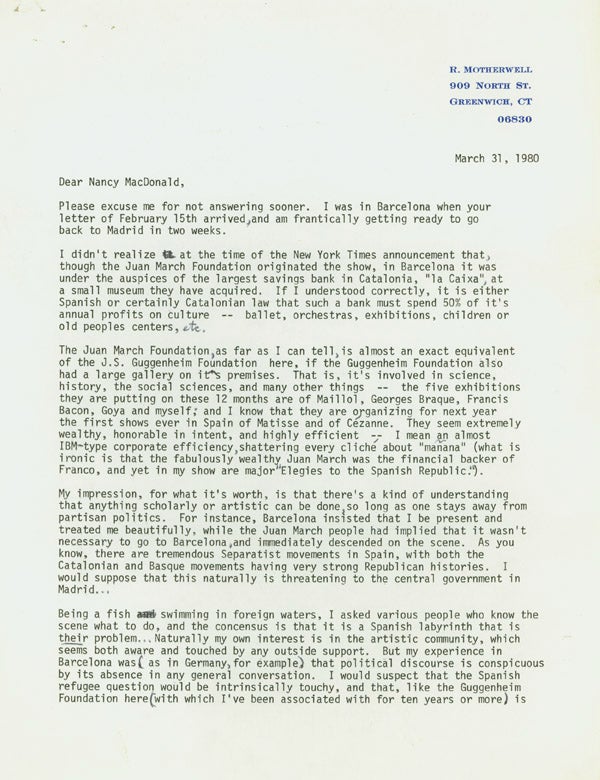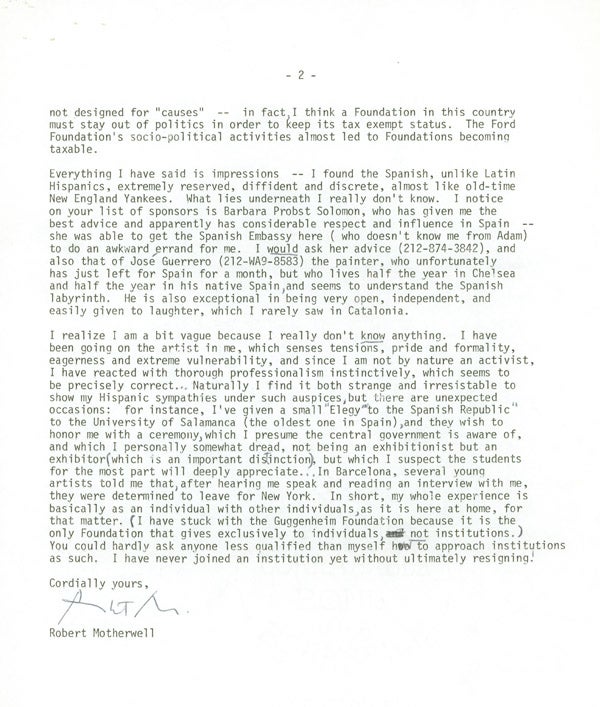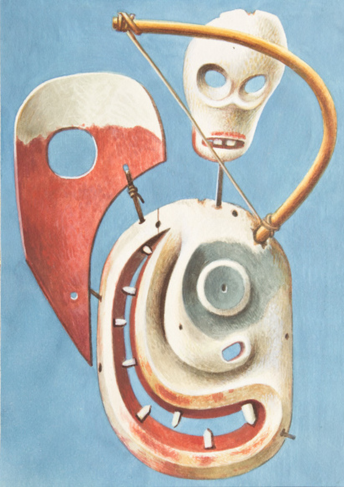Motherwell on Spanish Politics and Art
Typed Letter, signed (“Robert Motherwell”), to Nancy McDonald of Spanish Refugee Aid Inc. of NY.
909 North Street, Greenwich, CT: 909 North Street, March 31, 1980.
Price: $1,750.00
About the item
2 pp. typed on letterhead. 4to. Motherwell on Spanish Politics and Art. Fine, in brown cloth chemise.
Item #247193
Lengthy typed letter with excellent content concerning Motherwell’s uneasy negotiation of Spanish politics and art. In 1980 the Jaun March Foundation and the Catalan bank La Caixa organized the first exhibition of Motherwell’s work in Spain. His series of works titled Elegies for the Spanish Republic, begun in 1949 and continued until his death in 1991, totaled more than 170 works and would strongly link the artist with anti-Francosim and the lost Spanish Republic. However, as this letter demonstrates, in person, Motherwell maintained a professional, neutral stance, and seemed to have trouble engaging the Spanish in any political conversation.
Reading, in part: “I didn’t realize at the time of the New York Times announcement that, though the Juan March Foundation originated the show, in Barcelona it was under the auspices of the largest savings bank in Catalonia, ‘la Caixa,’ at a small museum they have acquired. If I understand correctly, it is either Spanish or certainly Catalonian law that such a bank must spend 50% of it’s annual profits on culture … The Jaun March Foundation, as far as I can tell, is almost an exact equivalent of the J.S. Guggenheim Foundation here … They seem extremely wealthy, honorable in intent, and highly efficient — I mean an almost IBM-corporate efficiency, shattering every cliché about ‘mañana’ (what is ironic is that the fabulously wealthy Juan March was the financial backer of Franco, and yet in my show are major ‘Elegies to the Spanish Republic.’). My impression, for what it’s worth, is that there’s a kind of understanding that anything scholarly or artistic can be done as long as one stays away from partisan politics. For instance, Barcelona insisted that I be present and treated me beautifully, while the Juan March people [from Madrid] had implied that it wasn’t necessary to go to Barcelona, and immediately descended on the scene. As you know, there are tremendous Separatist movements in Spain … Being a fish swimming in foreign waters, I asked various people who know the scene what to do, and the concensus [sic] is that it is a Spanish labyrinth that is *their* problem … Naturally my own interest is in the artistic community, which seems both aware and touched by any outside support. But my experience in Barcelona was (as in Germany, for example) that political discourse is conspicuous by its absence in any general conversation … Everything I have said is impressions — I found the Spanish, unlike Latin Hispanics, extremely reserved and discrete, almost like old-time New England Yankees. What lies underneath I really don’t know … I realize I am a bit vague because I really don’t *know* anything. I have been going on the artist in me, which senses tensions, pride and formality, eagerness and extreme vulnerability, and since I am not by nature an activist, I have reacted with thorough professionalism instinctively, which seems to be precisely correct … Naturally I find it both strange and irresistable [sic] to show my Hispanic sympathies under such auspices, but there are unexpected occasions: for instance, I’ve given a small ‘Elegy to the Spanish Republic’ to the University of Salamance (the oldest one in Spain), and they wish to honor me with a ceremony, which I presume the central government is aware of, and I personally somewhat dread, not being an exhibitionist but an exhibitor … In Barcelona, several young artists told me that, after hearing me speak and reading an interview with me, they were determined to leave for New York. In short, my whole experience is basically as an individual with other individuals, as it is here at home, for that matter. (I have stuck with the Guggenheim Foundation because it is the only Foundation that gives exclusively to individuals, *not* institutions.)”.



